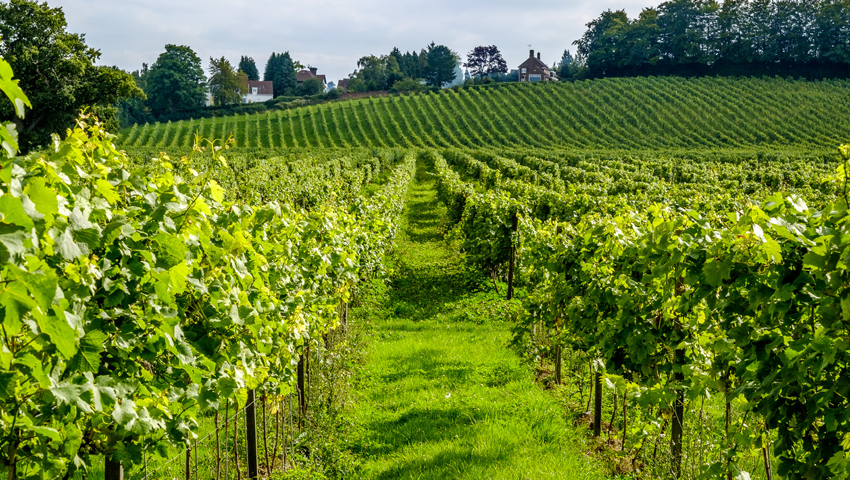A SAVILLS Spotlight research paper has taken a deep dive into UK wine. It says “Creating multiple income streams and tapping into niche areas such as viticulture allows businesses to mitigate risk from economic, political and climatic uncertainty.
“Growing grapes in Europe is no longer restricted to the Mediterranean. It is one of the fastest growing areas of the UK economy and an opportunity for landowners to diversify. Viticulture can begin as a small project, needing only around three hectares potentially to turn a profit. This small commitment could appeal to those with smaller holdings or those who want a new enterprise without adversely affecting existing rotations.
“Our nation’s talent for wine-making was only recognised around 20 years ago, but has grown rapidly to meet an increasing demand for domestic vintages. Yields of grapes can vary a great deal from year to year because of the weather. Poor years occurred in 2008 and 2012 through bad weather and low light levels. However, the extreme heat of 2018 has been described as“the worst summer for decades” by arable farmers, while English winemakers described the same summer as “near perfect”. A high quantity of high quality grapes gave 15.6 million bottles of wine.
“Demand for UK wine is currently ahead of supply. Almost all of the area under vine is dedicated to high quality grape varieties and that area is growing fast. It has tripled since 2000.
Savills recommends five steps to a successful vineyard. They say “There are many reasons for investing in diversification projects and particularly in wine. With potential for funding dedicated to development and diversification after Brexit, there are plenty of opportunities to help diversify. However, both grapes and the financials remain at the mercy of external factors from weather to politics. But with clear and informed objectives, a robust business plan and quality management, a successful business can be developed.
1 – Market
Any successful business must know its customers and whether the price they are willing to pay delivers a profitable margin to the business above any costs incurred. Export markets, especially to the Far East, are booming, but needless to say there is a cost that must be paid in order to access these areas. A demand for a product must first be established in the country concerned, which often requires strong investment in marketing in order to access that country’s wholesale and retail markets.
2 – Business plan
Robust interrogation of a vision for an enterprise will have a significant bearing on all elements of a venture, from the site selection and choosing the right variety of grape, to growing and marketing the final product. There are many factors to consider in setting up a vineyard. Owning an on-site processing units, for example, allows finer tuning of the end product, but that comes at a high initial cost and the employment of specialist vintners may be necessary.
3 – Site
Ideal land for viticulture in the UK often means sheltered, south facing slopes away from the coast, but no higher than 100m above sea level. The quality of the end product relies heavily upon the choice of land. Savills offers a GIS-based site finding service that considers all aspects of the land and local climate to ensure the grape growing conditions are optimised.
4 – Expertise
The sensitivity of vines to prevailing conditions requires informed, precise and regular attention to minimise risk and maximise opportunity. Partnering or contracting services from an expert third party can deliver the satisfaction of a new undertaking, while avoiding mistakes and
delivering a healthy revenue.
5 – Added value
Diversification into wine production often provides additional opportunities including:
- Public: tastings, tours, fruit picking
- Retail: farm shops, cafés and restaurants
- Events: weddings, photography, corporate
- Leisure: holiday homes, spa retreats,
wellbeing - Grazing: poultry, sheep, specialist livestock
